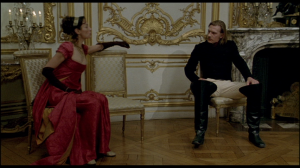Director: Jacques Rivette
Screenplay: Pascal Bonitzer, Christine Laurent, Jacques Rivette
Novel: Honoré de Balzac (1834)
Jacques Rivette is famous among the French New Wave directors for making very long, very talky films, as well as for habitually disregarding narrative flow. As Saul Austerlitz (in a Great Directors entry for sensesofcinema.com) writes: “Rivette has expressed his belief in the ideal cinema being one of ordeal, namely a cinema that challenges its viewers to break through mainstream, middlebrow notions of narrative and cinematic technique, into a wider view of acceptable filmic topics.” Some of Rivette’s more famous “ordeals” include his impossible-to-see, thirteen-hour serial Out 1 (1971) (and its abridged 255-minute version, Out 1: Spectre [1972]), on the expansive topic of ‘60s radicalism and conspiracy-think, as well as his critically celebrated, four-hour La belle noiseuse (1991), on the topic of the intensive labour that goes into an artist and model’s creation of a painting.
While I haven’t seen much of Rivette’s work yet, I can attest, from what little I have seen (including the spooky-lovely Céline and Julie Go Boating [1974], and the delectable comedy Va savoir [2001]), that his “ordeals” are very much worth undergoing, and have afforded me some of the most rewarding, long-lingering viewing experiences of the last few years. Having just watched his 2007 film The Duchess of Langeais, however, I’m not sure I’m ready to place it among Rivette’s better works.
Duchess, based (as several Rivette films are) on an Honoré de Balzac novel, concerns the calamitous, unconsummated “romance” between a wealthy Parisian noblewoman (the Duchess of the title, played by Jeanne Balibar) and a decorated general of the French Army (Guillaume Depardieu), mostly set in 1820s Paris. At the beginning of the film, the General has travelled to a Spanish convent in search of his lost beloved, the Duchess, and discovers she has cloistered herself there as a nun. Confronting each other in a startling scene from either side of prison bars in the cloister, their dialogue hints at the great course of events that has led these two apparent lovers to such a literal divide from each other (each imprisoned by her/his thwarted desires). The film then flashes back to recount the (anti-)romantic history between the two, detailing over the course of two hours the various games of courtship, denial, and possession that comprised their strange relationship and attraction.
Without getting into the specifics of the narrative, I will say that I found the romance between the Duchess and the General incredibly difficult to cotton to. A kind of malaise set in for me about mid-way through the rather repetitious account of their early courtship, when the Duchess excuses herself from consummating the relationship with the General by arguing at length that her civil manners (she is married to a Duke we never see), and her religious beliefs compel her to act with “prudence.” By the time the General kidnaps the Duchess, and threatens her with a red hot branding iron (which finally inflames the Duchess’s own desires, and puts in motion the events that will lead her to the cloister), you may struggle to understand why the two lovers should be so obsessed with each other: after all that dry talk of the first half, the passion seems forced, rote (but maybe I missed the nuances of the slow build-up–Rivette’s “ordeal”).
This is not to say that The Duchess of Langeais doesn’t contain much to recommend it, even if you lose interest in the machinations of the love plot, as I did. In one sense, the film demands to be seen and appreciated simply as a sensual experience. Its mise-en-scène—camera placement and movement; orchestration of all elements of production design in the frame—is as luxurious as any I can recall from films of the last decade. The stills I’m posting here highlight rather well, I think, the richness of Rivette’s colour palette; often the saturated greens, reds, and blues of the characters’ costumes, especially remarkable in dusky night scenes, seem like something out of a fantastical dream: what Cocteau’s La belle et la bête (1946) might have looked like, had it been filmed in colour. And the sound design, as many critics have noted before me, is simply superb; the soft crackling of a fireplace in several scenes was enough to make my head go warm with pleasure.
The acting is top-notch, as well; the late Guillaume Depardieu (who died in 2008 of complications from pneumonia) is an endlessly fascinating screen presence—tortured, intense, vulnerable (in his review of the film, critic Owen Gleiberman likens Depardieu’s General to “an angry, crestfallen lion”). If you haven’t seen Guillaume Depardieu (son of Gerard) in a film before, do yourself a favour and rent this (or Leos Carax’s great Pola X [1999]); I’m sure you’ll understand then what a huge loss to film acting his death occasioned.
-Cam




